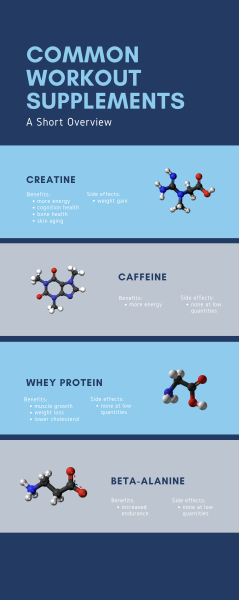Creatine is a natural amino acid compound that is commonly found in various meats such as fish and poultry. The naturally occurring compound has various health benefits such as increased energy, muscle recovery and cognitive function. As a result of its energy-boosting properties, creatine is now one of the most popular workout supplements on the market.
In addition to a growing market size, creatine is also increasing in popularity among student-athletes. Senior Darya Pereverzeva, who has taken many different workout supplements throughout her weight-lifting career, believes creatine helped increase her training efficiency.
“[The supplements] definitely have a positive impact on weightlifting,” Pereverzeva said. “Because a lot of [supplements] supply your blood to provide enough oxygen for your muscles and just store more [vitamins] that you might be lacking as an athlete.”
Sophomore Suhan Hajela shares Pereverzeva’s sentiment. He adds that creatine is not just beneficial for muscle-building, but is also convenient as a quick source of nutrients.
“It’s [convenient],” Hajela said. “I can just have a [creatine] shake and use [creatine] as a replacement for meat.”
Because minimal amounts of creatine are obtained through red meats and seafood, by making a quick creatine shake, Hajela found that he can reap the benefits of the creatine in large quantities without much effort. However, despite the various health advantages that come with creatine supplements, Pereverzeva warns that some pre-workouts may be especially harmful to gut health.

C4, a pre-workout line made by Cellucor, specializes in supplying energy for athletes before a workout. However, several ingredients used in various pre-workouts like C4, such as sodium bicarbonate and caffeine, can cause gastrointestinal problems such as acid reflux. As a result Pereverzeva now opts for more natural sources of energy.
“Now I switched to more sugary foods beforehand like a teaspoon of honey or something natural,” Pereverzeva said. “But never anything caffeine related.”
Science teacher Kyle Jones believes that lesser known supplements like creatine can be subject to misconceptions due to the artificial process used to create them, citing misconceptions surrounding another supplement called whey protein, which is a common byproduct in cheese production.
“If I eat a piece of meat, the protein in it is natural because it’s found in there in the same form,” Jones said. “Whereas [in a supplement] like whey protein, they extract the protein from dairy and isolate it from the rest. I can see someone making an argument [that] that’s not natural, because you can’t just go into nature and find whey protein just sitting there.”
Pereverzeva adds that creatine is notoriously confused with steroids, a performance enhancer that is blacklisted from the large majority of athletic competitions. While both creatine and steroids are lab-synthesized substances that enhance muscle growth, creatine is a naturally occurring compound, whereas steroids are synthetic substances that can’t be found in animals. Because of their similar functions, Pereverzeva states that some may even consider using supplements as cheating. However, Jones says the two substances at their core are inherently different, both in structure and function.
“In the case of creatine, it’s a precursor to ATP, which helps provide energy to your muscles, which then helps with increasing the amount of reps you could do,” Jones said. “[For] anabolic steroids, you’re providing your body with a hormone that is changing [your] hormonal profile such that your body will increase the amount of muscle building it’s going to be doing.”
Hajela believes that the most significant difference between creatine and steroids is the general consensus on each substance’s effects on the body. While creatine features a plethora of health benefits, steroids include various health consequences such as acne, deteriorated organ health and a lowered lifespan. While both supplements and steroids are synthesized in a lab, Pereverzeva believes that misconceptions about workout supplements and their differences from steroids have molded public perception into believing that some workout supplements are a lot less natural than they actually are.
“A lot of people see supplements as cheating,” Pereverzeva said. “[But] if you’re going to a gym and you’re already building muscle, you’re already doing something that your body’s not naturally supposed to do. We’re naturally supposed to be very skinny runners running away from things. Going to the gym already is unnatural for you, so taking supplements [like creatine] to help you is not [unnatural at all].”









